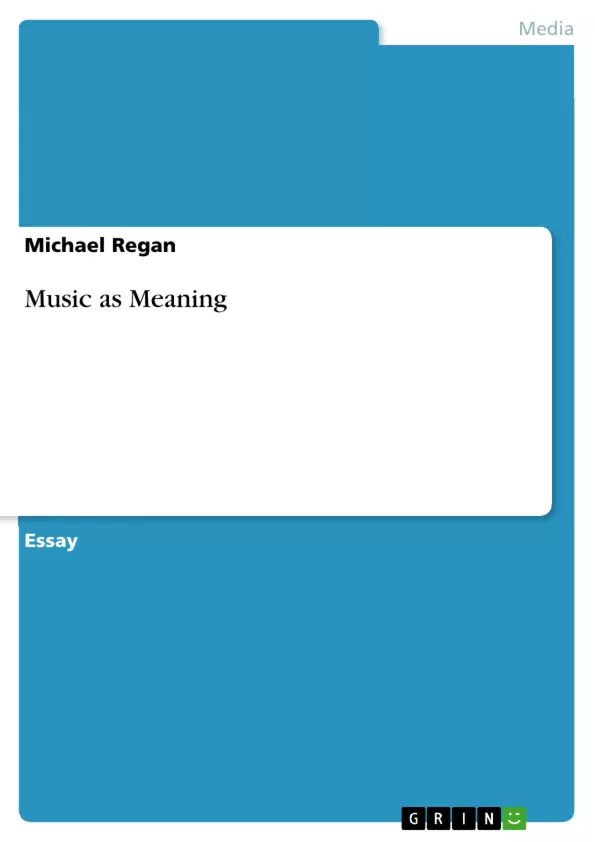My dictionary defines meaning as “what somebody wants to express” and “what something signifies”. As a teacher I used to ask my composition students why they wanted to write music, to which question the most frequently occurring answer, and one that I suspected they had usually not fully thought-out, was “To express myself.” But how do composers express themselves in music, and is self-expression, or for that matter, any clear-cut expression really possible, or just an illusion. Can music, of itself, really express or signify anything, and if so, how?
Because it seems that of all the arts it is music that is the least amenable to attempts at explaining its meaning. With literature and the representative visual arts meaning is usually obvious and intended by the author or artist. However, music does share its reticence as to meaning with abstract art and with some experimental literature. Or it could be said that the latter two art forms have taken on the imprecision of meaning possessed by music.
Inhaltsverzeichnis (Table of Contents)
- Music as Meaning . . ?
- Meaning in Music
- Levels of Implied Meaning
Zielsetzung und Themenschwerpunkte (Objectives and Key Themes)
This essay explores the complex question of meaning in music, examining whether music possesses inherent meaning and to what extent it can be considered a language. It delves into the subjective nature of musical interpretation, influenced by cultural backgrounds, personal experiences, and the composer's intentions.
- The subjective nature of musical meaning
- The role of cultural background and personal experience in interpreting music
- The distinction between music as a language and music as a sonic structure
- The relationship between music and extra-musical ideas
- The varying levels of implied meaning in different musical genres and styles
Zusammenfassung der Kapitel (Chapter Summaries)
- Music as Meaning . . ?: This chapter introduces the central question of the essay: Does music have inherent meaning, and if so, how is it conveyed? The author explores the ambiguity of musical meaning compared to other art forms and discusses the difficulty of pinpointing precise extra-musical significance in music.
- Meaning in Music: The chapter delves into the debate surrounding the inherent meaning of music and its potential to be considered a language. The author argues that while music can evoke moods and emotions, it doesn't function as a language in the sense that words do. It emphasizes the role of personal and cultural associations in shaping individual interpretations of musical meaning.
- Levels of Implied Meaning: This chapter explores the varying degrees of implied meaning found in different musical styles and compositions. It differentiates between contrapuntal music, descriptive instrumental music, and music with explicit textual or theatrical elements. The author highlights the importance of the composer's intent, the listener's background, and the context of the musical experience in shaping understanding.
Schlüsselwörter (Keywords)
The key terms and concepts explored in this essay include: musical meaning, inherent meaning, language of music, subjective interpretation, cultural influence, personal experience, extra-musical ideas, implied meaning, contrapuntal music, descriptive music, opera, oratorio, composer's intent, listener's experience.
Frequently Asked Questions
Can music really express or signify anything?
The essay explores whether music has inherent meaning or if the sense of "expression" is an illusion created by the listener's associations.
Is music considered a language in this essay?
The author differentiates between music as a language and as a sonic structure, arguing that while it evokes emotions, it lacks the precise semantics of words.
How do cultural backgrounds affect musical interpretation?
Meaning in music is highly subjective and influenced by the listener's cultural environment, personal experiences, and education.
What are the different levels of implied meaning in music?
The essay distinguishes between abstract contrapuntal music, descriptive instrumental music, and music with explicit texts like opera or oratorio.
What is the role of the composer's intent?
While many composers aim "to express themselves," the essay questions how this intention is transmitted and if the listener perceives the same meaning.
- Quote paper
- Michael Regan (Author), 2011, Music as Meaning, Munich, GRIN Verlag, https://www.grin.com/document/165780



